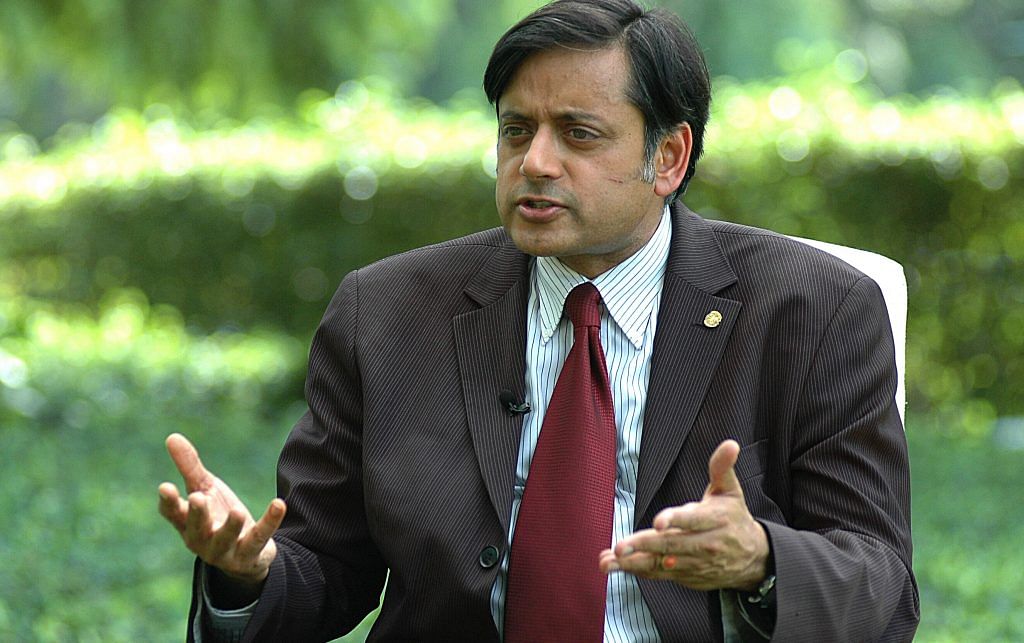If Advani was contrite after 1992, he should have worked towards resolving the temple issue, especially as the NDA-I strongman.
Shashi Tharoor, that eloquent author and consummate politician, tied himself up in knots when he more or less gave a clean chit to the two tallest leaders of the BJP in the last four decades – L.K. Advani and Atal Bihari Vajpayee – in the Babri-Ayodhya issue.
He said that most good Hindus would not want the Ram Mandir to be built by demolishing another place of worship. He quoted Advani as saying that the day of the Babri Masjid demolition was the saddest day of his life, and that Vajpayee was always amenable to a compromise on the construction of the temple. Both, according to him, condemned the act of demolition.
As a civil servant-(even an international civil servant) turned-politician, Shashi Tharoor can always find grounds for being generous to his fellow politicians. But not me, a dyed-in-the-wool Indian civil servant, who is always sceptical of the underlying motivations of politicians and looks for the proverbial slip between the cup and the lip whenever they say something in public.
Also read: Yogi & Korean first lady’s Ayodhya Diwali: Religious tourism or fanning Ram Mandir demand?
I was a District Magistrate in Maharashtra and later posted in Delhi during those years, and was in the thick of the events leading up to the Babri Masjid saga Part-I, which culminated with the arrest of Advani in Bihar and the foiling of karsevaks’ efforts to demolish the mosque in October 1990. I can unequivocally state that the final demolition in 1992 was the successful denouement of the six-year campaign, which began with Rajiv Gandhi’s ill-conceived decision to allow the unlocking of the temple and picked up tempo with the Rath Yatra led by Advani.
Through 1989, the police force and the magistracy in my district (and all over Maharashtra) were on their toes as the Vishva Hindu Parishad, supported by the BJP and the Shiv Sena, upped the ante on the shilanyas in Ayodhya and the transport of consecrated bricks by karsevaks to the disputed site at Ayodhya. The BJP was then the weaker force in the alliance and relied on their Shiv Sena brethren to take to the streets.
The success of the alliance in entering the Lok Sabha in 1989 and making significant inroads into the Maharashtra state assembly in 1990 gave their efforts a shot in the arm, as witnessed in the post-Babri Masjid horrors in Mumbai.
Lalu Prasad Yadav’s arrest of Advani and the strong-arm response of Mulayam Singh Yadav quelled the Rath Yatra movement in 1990, with the BJP withdrawing its support to the V.P. Singh government and reserving its ammunition for a future date.
Historians will need to assess whether the “Rath Yatra” of Advani was a response to the Mandal move of V.P. Singh or whether, sooner or later, a move on the Mandir was inevitable, given that the BJP had improved its Lok Sabha tally from an abysmal 2 in 1984 to 85 in 1989 and was looking at the number one spot in Delhi.
Also read: BJP will hand Ayodhya victim card to every Hindu voter ahead of 2019 elections
Advani should have taken a leaf out of Mahatma Gandhi’s book, who acknowledged his responsibility and called off the Non-Cooperation Movement in 1922 after the Chauri Chaura incident. If Advani was really contrite after 1992, he ought to have invested all his energies in resolving the temple issue, especially as the NDA-I strongman. Alternatively, he should have withdrawn from political life, admitting that he had failed in convincing the temple supporters to reach a mutually acceptable compromise with their brethren from the other religion. The same could be said of the Advani-Vajpayee response to Gujarat 2002: Advani lent tacit support to the incumbent chief minister and Vajpayee failed to enforce ‘Raj Dharma’.
The two key tenets of a healthy liberal democracy are respect (indeed, reverence) for the rule of law and decision-making based on consensus. The Uttar Pradesh government of 1992 and its political wing gave short shrift to both the principles. While assuring the Supreme Court that it would make all efforts to maintain status quo, the UP government presided over the demolition of the mosque, aided by a pusillanimous Congress government at the Centre. No meaningful proposals were put forward to assuage the hurt felt by the largest minority community in India, which saw the social contract, evolved between 1947 and 1950 (in sharp contradistinction to our immediate western neighbour), being ripped apart.
UP’s chief minister in 1992 Kalyan Singh had the dubious distinction of being indicted by the Supreme Court for contempt of court. That he is today the Governor of an important state is a telling commentary on our political morality.
Also read: A journalist recounts helping prime accused in Babri Masjid demolition sneak into Ayodhya
The same political party that has orchestrated opposition to the entry of women into the Sabarimala temple, despite a clear Supreme Court order, is hell-bent on an early order from the Supreme Court for construction of the Ram Mandir. How they presume that the Supreme Court will necessarily rule in their favour is a cause for wonder. What is a greater cause for concern is that after a quarter century, religious groups in UP and elsewhere are engaging in muscular posturing for an early resolution to the issue. The UP government is naturally favouring the majority community, with no apparent intention to address the concerns of the minority community.
George Santayana famously observed, “Those who cannot remember the past are condemned to repeat it”. We can only hope and pray that a spirit of generosity and sanity will prevail in these politically-charged times. The stakes are too high for short-sighted moves that may tear apart the social fabric and imperil the democratic legacy of this nation.
The author is a former civil servant.
